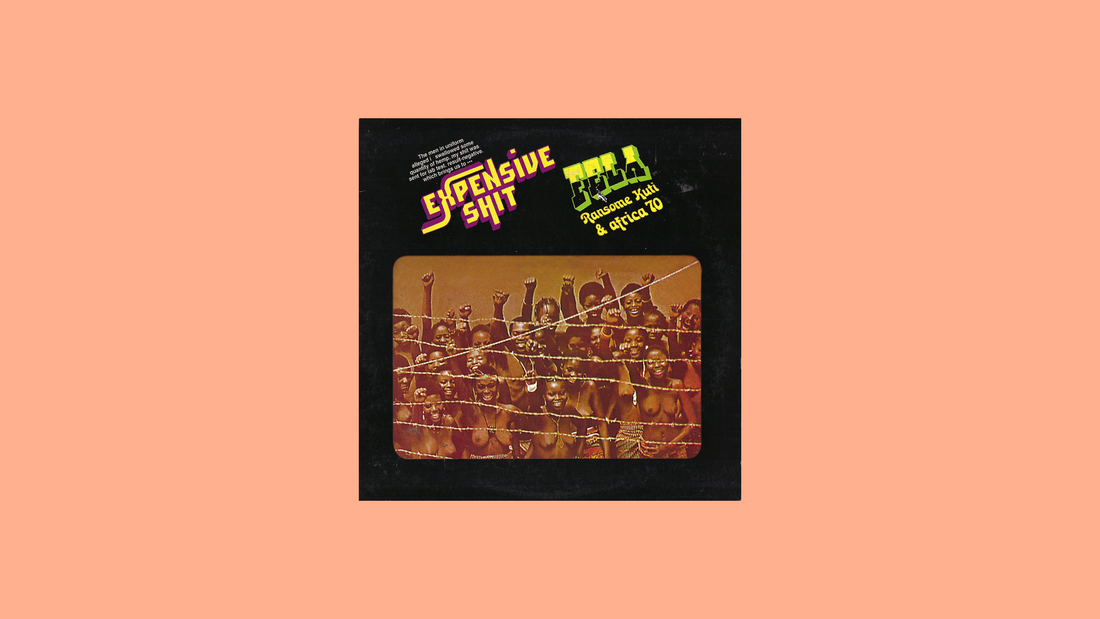
Fela Kuti – Expensive Shit (1975)
By Rafi Mercer
The groove begins quietly: drums locked into a steady pattern, bass circling with hypnotic insistence, guitars flickering like heat haze. Then the horns arrive — sharp, urgent, commanding — before Fela Kuti’s voice cuts through, half-sung, half-declaimed, filled with irony and fire. This is Expensive Shit, released in 1975, one of the defining works of Afrobeat and one of the fiercest political statements ever pressed to vinyl.
Fela Kuti was not simply a musician. He was a bandleader, a political dissident, a cultural prophet. By the mid-1970s, he had forged Afrobeat: a fusion of Yoruba rhythms, highlife, jazz, and funk, stretched into long, hypnotic compositions. At the same time, he had become a relentless critic of Nigeria’s military government, using his music as weapon and rallying cry. Expensive Shit sits at the intersection of those roles — musically transcendent, politically dangerous.
The title comes from a notorious incident. Nigerian police, desperate to imprison Fela, planted a joint on him. He swallowed it before they could arrest him. The authorities detained him until he produced a stool sample, which they hoped would contain evidence. Instead, Fela managed to switch the sample and walk free. The story became legend, and Fela turned it into art. The title track, “Expensive Shit,” is both biting satire and triumphant defiance: the absurdity of power exposed, mocked, and immortalised in groove.
Musically, the track is quintessential Afrobeat. The groove is relentless, lasting over thirteen minutes. Drums, congas, and shekere lock together in polyrhythmic precision. The bassline anchors, repeating with hypnotic insistence. Guitars chop tight patterns, interlocking with keyboards. Horns punctuate with sharp stabs, sometimes unison, sometimes counterpoint. Over it all, Fela delivers his vocal — sardonic, mocking, rhythmic, as much speech as song. The repetition creates trance, but also tension: the groove builds, layer by layer, until it becomes inescapable.
The second track, “Water No Get Enemy,” offers contrast. Its groove is lighter, more fluid, its message more universal. Fela sings of water’s essential nature — how no one can resist or reject it, how it flows into every life. The metaphor is both literal and political. Water becomes a symbol of persistence, of inevitability, of the people’s strength. The track is gentler, more reflective, but equally powerful, its groove shimmering with grace.
Together, the two tracks encapsulate Fela’s genius: biting political critique on one hand, timeless philosophy on the other. Both are carried by grooves that seem infinite, both are rooted in Yoruba rhythm yet expansive enough to embrace jazz improvisation, funk energy, and modernist repetition.
Culturally, Expensive Shit was explosive. Fela’s compound, the Kalakuta Republic, had already become a symbol of resistance — a commune, recording studio, and political hub. His music gave voice to those silenced by authoritarian rule, and his defiance made him a target of constant harassment. This record, with its mocking of the authorities and its hymn to resilience, was not just entertainment. It was survival, resistance, prophecy.
Listening today, the record has lost none of its vitality. The grooves remain irresistible, the satire sharp, the philosophy resonant. It demands slow listening — not as background but as immersion. The length of the tracks, their repetition, their layering, all serve a purpose: to bring you into the trance of rhythm, to make you inhabit the groove until you feel its force in your body.
For listeners across cultures, genders, and generations, Expensive Shit is welcoming. Its grooves are universal, its humour accessible, its message clear. Fela’s voice, while fierce, is not exclusionary. It addresses the powerful but embraces the people. Women, men, seasoned jazz fans, funk devotees, or newcomers to Afrobeat all find space in its sound.
On vinyl, the record is electrifying. The bass resonates through the floor, the percussion rattles the walls, the horns pierce the air. The analogue warmth amplifies the groove’s physicality, while the surface crackle blends seamlessly with the music’s raw energy. The sleeve — Fela, charismatic and defiant — captures the spirit: artist as fighter, groove as weapon.
Nearly fifty years on, Expensive Shit endures as one of Fela Kuti’s greatest achievements. It is both deeply local and universally resonant, both satire of a specific regime and prophecy for all time. It shows that music can expose power’s absurdity, that rhythm can carry truth, that a groove can be both joy and resistance.
To listen today is to enter that space: the groove unfolding, the horns rising, Fela’s voice mocking and declaring. You hear not just music but defiance, not just rhythm but philosophy. And you realise that the most “expensive” thing, in the end, is freedom — bought not with money, but with courage, persistence, and sound.
Rafi Mercer writes about the spaces where music matters. For more stories from Tracks & Tales, subscribe, or click here to read more.














